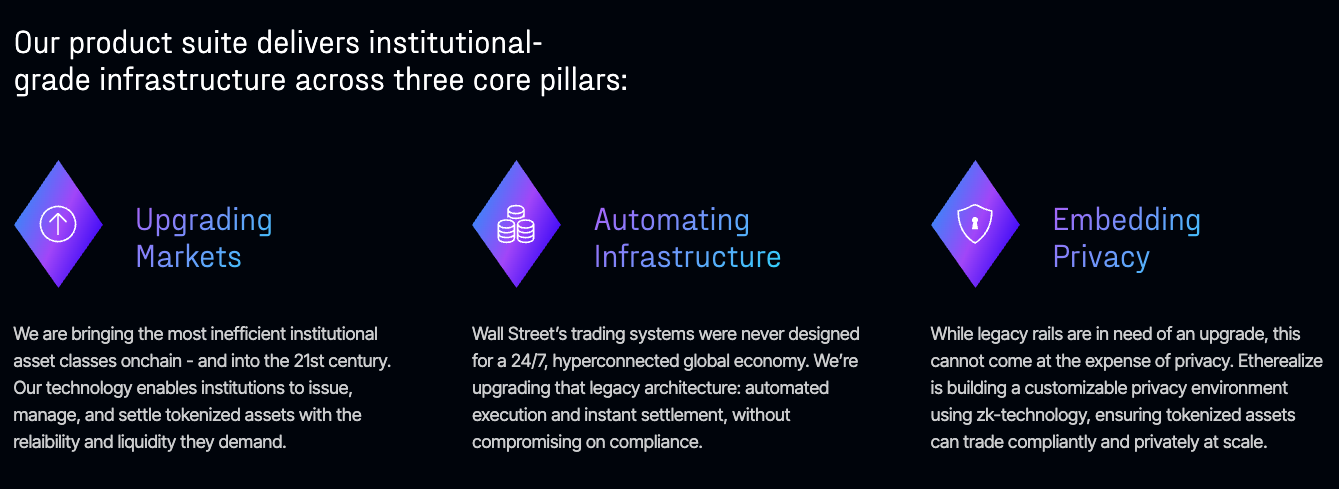Written by: Eric, Foresight News
On the evening of September 3rd (GMT+8), Fortune magazine reported that Etherealize had completed a $40 million financing round, led by Electric Capital and Paradigm, with participation from Ethereum co-founder Vitalik and the Ethereum Foundation. Electric Capital and Paradigm have never hesitated to spend big in the Web3 space, especially within the Ethereum ecosystem, and both are major supporters of Ethereum DAT-listed companies. However, it is rare for both Vitalik and the Ethereum Foundation to participate together.
Etherealize is very concise in its self-introduction, describing itself on X as "the institutional-grade product, BD, and marketing department of the Ethereum ecosystem," and its website only features the vision of "reshaping Wall Street" and "bringing the world to Ethereum by providing research, content, and products." In terms of products, Etherealize targets institutional-grade infrastructure, offering issuance, management, and settlement of tokenized assets, as well as corresponding automated compliance infrastructure, and plans to introduce privacy features through zero-knowledge proofs.

According to Etherealize, it has an engineering team with deep understanding of Ethereum, a leadership team with decades of experience in financial institutions, and channels to communicate with the SEC, Treasury Department, and Congress to help formulate regulations. Western investment institutions have always been willing to bet on large B2B businesses, but such a substantial investment in a startup is clearly a "bet on people," and I have found some clues in the team composition.

The most outstanding member of the Etherealize team is undoubtedly Danny Ryan, a co-founder who made significant contributions to The Merge and the launch of the Ethereum Beacon Chain, but left the Ethereum Foundation team in September last year. In his farewell letter on Github, Danny Ryan stated that he left for personal reasons. Perhaps at that moment, he realized that simply nitpicking on technical aspects would not push Ethereum further, and that helping a team capable of bringing Ethereum to the world with his technical expertise was the right path.
On the technical side, Etherealize co-founder and CTO Zash Obront was previously a co-founder of Scribe Media, a company providing book publishing services. In August 2021, he joined Snowcap Technology as a security researcher; the company focuses on security, providing services in AI, VPN, WIFI, and enterprise systems.
The other two founding engineers responsible for technology also have impressive backgrounds. Alec Charbonneau was previously a product manager at Circle, the first stablecoin company to go public, and later a software engineer at Stellar, which, like Ripple, focuses on settlements. The other engineer, Alex Wilton, was a product manager at Tesla and at Rivian, another electric vehicle company that raised over $10 billion in 2021.
Product CEO Jay Katz has a background closely related to strategy, having worked in finance, software, smart hardware, law firms, and consulting companies. According to LinkedIn, his actual position is CEO of Lending Market Solutions. Working alongside him is Jennifer Laino, who is in charge of credit operations and has extensive experience in the financial industry, having served as Assistant Vice President at Lehman Brothers, Vice President at Bank of America Merrill Lynch, and advisor at Blackstone Group.
Another co-founder and CEO with many years of experience in financial lending is Vivek Raman, who has held senior credit business positions at Morgan Stanley, UBS, Deutsche Bank, and Nomura. In September 2021, he joined Celsius as a Senior DeFi Researcher during the 2022 bear market collapse. Afterwards, Vivek Raman joined BitOoda, a digital asset investment bank that completed its Series A funding in early 2023, as General Manager. At BitOoda, he focused on bringing institutions into the Ethereum and L2 ecosystems.
Clearly, Etherealize's plan to "bring Wall Street to Ethereum" is initially targeting the credit sector. I speculate that their implementation path may involve launching an on-chain settlement lending system combined with stablecoins and other products. Of course, such products differ from DeFi and may only provide solutions for financial institutions.
In terms of marketing and operations, Etherealize has chosen people with more experience in the Web3 field. Marketing Director Valeria Salazar was previously Head of Marketing Strategy and Developer & Ecosystem Relations at Phi Labs, while Business Operations Manager Morgan Takach was previously Head of Strategy and Operations at Polyhedra.
Etherealize's claim that its team has extensive experience in both Web3 and finance is not unfounded, and it has also seized the trend of institutions experimenting with asset tokenization. Using Ethereum to reshape finance is a story that has been told since the beginning of DeFi Summer. Even as traditional institutions try to put assets on-chain, we still cannot determine the market size of this business, but building a bridge between Ethereum and Wall Street is itself a direction worth exploring for Ethereum.
In addition to specific business operations, Etherealize has also clearly expressed on its official website its desire to promote global adoption of Ethereum and the L2 ecosystem as an "ambassador" for Ethereum. Overall, Etherealize is taking over the "go to market" part that the Ethereum Foundation has not done well, through a commercial company, and the specific results are worth looking forward to.



